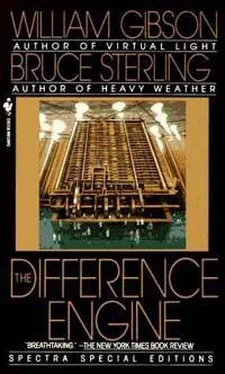William Gibson - The Difference Engine
Здесь есть возможность читать онлайн «William Gibson - The Difference Engine» весь текст электронной книги совершенно бесплатно (целиком полную версию без сокращений). В некоторых случаях можно слушать аудио, скачать через торрент в формате fb2 и присутствует краткое содержание. Жанр: sf_cyber_punk, fantasy_alt_hist, на английском языке. Описание произведения, (предисловие) а так же отзывы посетителей доступны на портале библиотеки ЛибКат.
- Название:The Difference Engine
- Автор:
- Жанр:
- Год:неизвестен
- ISBN:нет данных
- Рейтинг книги:3 / 5. Голосов: 1
-
Избранное:Добавить в избранное
- Отзывы:
-
Ваша оценка:
- 60
- 1
- 2
- 3
- 4
- 5
The Difference Engine: краткое содержание, описание и аннотация
Предлагаем к чтению аннотацию, описание, краткое содержание или предисловие (зависит от того, что написал сам автор книги «The Difference Engine»). Если вы не нашли необходимую информацию о книге — напишите в комментариях, мы постараемся отыскать её.
The Difference Engine — читать онлайн бесплатно полную книгу (весь текст) целиком
Ниже представлен текст книги, разбитый по страницам. Система сохранения места последней прочитанной страницы, позволяет с удобством читать онлайн бесплатно книгу «The Difference Engine», без необходимости каждый раз заново искать на чём Вы остановились. Поставьте закладку, и сможете в любой момент перейти на страницу, на которой закончили чтение.
Интервал:
Закладка:
"But there has been no change in the contempt in which you honorable gentlemen seem to hold me. On the contrary, the last two nights have been taken up with a debate on a vote of want-of-confidence, directed, obviously and especially, against the head of the Government. The discussion has been marked with more than usual violence against my office, and there has been no defense from any of you—the members of my own Cabinet.
"How, under these circumstances, are we to successfully resolve the matter of the murder of the Reverend Alistair Roseberry? This shameful, atavistic crime, brutally perpetrated within a Christian church, has blackened the reputation of Party and Government, and cast the gravest doubts on our intentions and integrity. And how are we to root out the murderous dark-lantern societies whose power, and provocative daring, grows daily?
"God knows, gentlemen, that I never sought my present office. Indeed, I would have done anything, consistent with honor, to avoid assuming it. But I must be master in this House, or else resign my office—abandoning this nation to the purported leadership of men whose intentions are increasingly stark in their clarity. Gentlemen, the choice is yours."
Yes, sir, two-fifteen to be quite exact, sir—and no other way to be, as we're on the Colt & Maxwell system of patent punch-clocks.
Just a sort of dripping sound, sir.
For a moment I took it to be a leakage, forgetting the night was clear. Rain, I thought, and that was all my anxiety, sir, thinking the Land Leviathan would be damaged by damp, so I flung my lantern's beam up quick, and there the poor rascal hung, and blood all down the Leviathan's neck-bones, sir, and all on the—what d'ye call 'em?—the armatures, what hold the beast upright. And his head a bloody min, sir—no longer as you'd call a head at all. Dangling there by his ankles from this manner of harness, and I saw the ropes and pulleys going straight up, taut, into the dark of the great dome, and the sight struck me so, sir, that it wasn't till I'd sounded the alarm that I saw the Leviathan's head was missing too.
Yes, sir, I do believe that to be the case—the manner in which it was done. He was lowered down from the dome and did the job up there, in the dark, and paused when he'd hear my footsteps, and then continue his work. The work of some hours, for they'd had to rig their lines and pulleys. Likely I passed beneath them several times, on my watch. And when he'd got it free, the head, sir, someone else winched it up, and took it away through that panel they'd unbolted. But something must have given, sir, or slipped, for down he came, square into the floor, best Florentine marble that is. We found where his brains had been dashed, sir, though I'd as soon forget it. And I did then recall a sound, sir, likely of him striking, but no outcry.
If I may say, sir, what strikes me as vilest, in the whole business, must be the cool way they hauled him back up, quiet as spiders, and left him slung there, like a coney in a butcher's window, and stole away across the roof-top with their booty. There's a deal of meanness in that, isn't there?
–KENNETH REYNOLDS, night watchman, the Museum of Practical Geology, in deposition before Magistrate G. H. S. Peters, Bow Street, Nov. 1855.
MY DEAR EGREMONT,
I write to you to express my profound regret that the circumstances of the moment should deprive me of the opportunity and hope of enlisting your great capacity in the further service of Party and Government.
You will well understand that my recognition of your difficult personal circumstances is absolutely separate from any want of confidence in you as a statesman; this is the last idea I should wish to convey.
How can I close without fervently expressing to you my desire that there may be reserved for you a place of permanent public distinction?
Believe me always,
Yours sincerely,
I. K. BRUNEL–Ministerial letter to Charles Egremont, M.P., Dec. 1855.
On this occasion, our distinguished guest, the ex-President of the American Union, Mr. Clement L. Vallandigham, got as drunk as a fiddle. The eminent Democrat showed that he could be as profligate as any English Lord. He fumbled Mrs. A., kissed the shrieking Miss B., pinched the plump Mrs. C. black and blue, and ran at Miss D. with flagrant intent to ravish her!
Finally, after throwing our female guests into hysterics by behaving like an elephant in must, the noble beast was captured by main force, and carried upstairs, all four feet in the air, by our household staff. Within his room, Mrs. Vallandigham was awaiting him, in shift and mobcap. There and then, to our considerable amazement, this remarkable man satiated his baffled lust on the unresisting body of his legitimate spouse, and copiously vomited during the operation. Those who have seen Mrs. Vallandigham would not think this latter incredible.
News has now reached me that the former President of Texas, Samuel Houston, has died in Veracruz, in his Mexican exile. He was, I believe, awaiting any call to arms that might have brought him back to eminence; but the French alcaldes were likely too wily for him. Houston had his faults, I know, but he was easily worth ten of Clement Vallandigham, who made a shrinking peace with the Confederacy, and has allowed the vultures of Red Manhattan Communism to gnaw the carcass of his dishonored country.
–LORD LISTON, 1870.
[The following testament is a sound-recording inscribed on wax. One of the earliest such recordings, it preserves the spoken reminiscences of Thomas Towler (b. 1790), grandfather of Edward Towler, inventor of the Towler Audiograph. Despite the experimental nature of the apparatus employed, the recording is of exceptional clarity. 1875.]
I remember one winter and it was a very long cold winter, and there was dire poverty in England then, before the Rads. Me brother Albert, he used to get some bricks and cover them with bird-lime, and set 'em by the stables to catch sparrows. And he'd pluck them, clean them, him and me together, I helped him. Our Albert would make a fire and get the oven hot and we used to cook those little sparrows in Mother's roasting-tin, with a big lump of dripping in it. And me mother'd make a big jug of tea for us and we'd have what we'd call a tea-party, eating those sparrows.
Me father… he went to all the shopkeepers on Chatwin Road and got scrap-meat. Bones, you know, lamb-bones, all sorts of things, dried peas, beans, and left-over carrots and turnips and… he got some oatmeal promised him and a baker gave him stale bread… Me father had a big iron boiler… that he used to make gruel for the horses and he cleaned it all out and they made soup in this big horse-boiler. I can remember seeing the poor people come. They came twice a week, that winter. They had to bring their own jugs. They was that hungry, before the Rads.
And Eddie, did you ever hear tell of the Irish Famine, in the forties? I thought not. But the 'later crop failed then, two, three years in a row, and it looked mighty dire for the Irish. But the Rads, they wouldn't stand for that, and declared an emergency, and mobilized the nation. Lord Byron made a fine speech, in all the papers… I signed aboard one of the relief-boats, out of Bristol. All day, all night, we'd load big gantry-crates, with bills-of-lading from the London Engines; trains come day and night from all over England, with every kind of food. "God Bless Lord Babbage," the poor Irish would cry to us, with tears in their eyes, "Three cheers for England and the Rad Lords." They have long memories, our own loyal Irish… they don't never forget a kindness.
Читать дальшеИнтервал:
Закладка:
Похожие книги на «The Difference Engine»
Представляем Вашему вниманию похожие книги на «The Difference Engine» списком для выбора. Мы отобрали схожую по названию и смыслу литературу в надежде предоставить читателям больше вариантов отыскать новые, интересные, ещё непрочитанные произведения.
Обсуждение, отзывы о книге «The Difference Engine» и просто собственные мнения читателей. Оставьте ваши комментарии, напишите, что Вы думаете о произведении, его смысле или главных героях. Укажите что конкретно понравилось, а что нет, и почему Вы так считаете.









